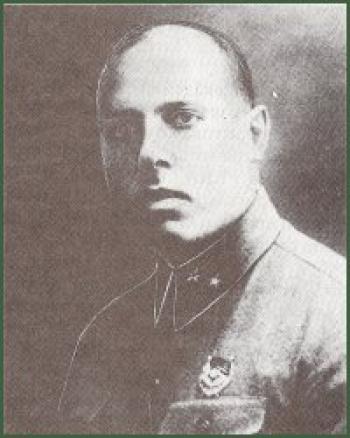Aron Shister was born in 1901 in Bukhara, in the family of a tailor.
The family later moved to Tashkent, where he grew up and went to school.
Shister (who would later change his name to "Arkady Borisov") exhibited leadership qualities from childhood. In 1918, he was one of the founders of the Komsomol in Turkestan (a historical region in Russian Central Asia; present-day Uzbekistan, Turkmenistan, Kyrgyzstan, and Tajikistan).
A year later, having completed secondary school, Arkady joined the Red Army. After successfully passing cavalry command courses, Borisov was appointed squadron commander. He went on to take part in the Civil War in Turkestan, and was awarded two Orders of the Red Banner for his service. In 1924, Borisov graduated from the Red Army Academy, whereupon he became commander of the Turkestan Military District, holding the rank of Deputy Chief of Staff.
The aftermath of the Revolution of 1917 saw the emergence of the Basmachi movement in Central Asia. This movement was both military-political and religious in nature, and it fought against the Bolsheviks and the Soviet regime. In the late 1920s, Borisov, as a regimental commander, took part in combat against Basmachi units, and was wounded in action.
Following a successful landing operation in the desert, Arkady Borisov wrote the book The Expedition of a Cavalry Group of the 8th Cavalry Brigade into the Karakum Desert in 1927 (1932), in which he analyzed the anti-Basmachi campaign.
By the mid-1930s, Borisov served as an administrator in the Red Army. His duties included writing military and scientific papers for the advanced training of the troops, and organizing cavalry regiments.
In 1937, Arkady Borisov was appointed commander of the Budyonny Cossack Regiment. However, he was arrested in 1938, during the "Great Purge".
In late June 1941, following the Nazi invasion of the Soviet Union, the Red Army suffered from an acute shortage of qualified military personnel, since many of the senior cadres had been repressed and executed by that point. Therefore, Arkady Borisov was released from jail, restored in rank, and sent to the front.
He became commander of the cavalry of the Southwestern Front. Borisov specialized in extricating military units from encirclement and making breakthroughs in particularly dangerous sectors of the front line.
As early as November 1941, Borisov was promoted to General Major and awarded his third Order of the Red Banner.
In December 1941, the cavalry corps under Borisov's command took part in the liberation of the cities of Yelets and Yefremov. A month later, his cavalry group liberated another strategically important city in the occupied Barvenkovo Raion (in the Kharkov Oblast).
In late May 1942, Soviet forces fighting on the Southwestern Front sustained heavy casualties. Although Borisov's group was able to penetrate behind German lines, this failed to change the situation. The Soviet troops of this front were encircled, and only 22,000 out of 350,000 soldiers were able to break out. The men of Borisov's group, which stayed in the German rear, were taken prisoner.
On May 27, 1942, Aron Shister was shot by the Germans.







